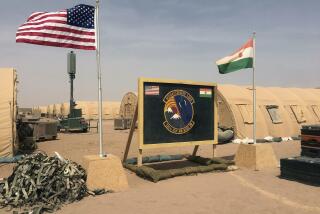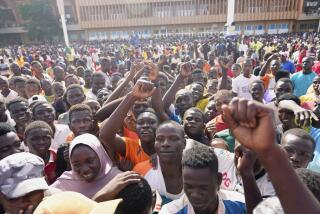Africans Take Control of an Outrage : A hopeful moment in war-riven Liberia
- Share via
It’s hard to imagine that peace may be at hand in Liberia after nearly four years of brutal civil war, fought largely along tribal allegiances. The three major rival groups are to begin to seat a transitional government in this West African nation and thousands of soldiers are expected to come forward and disarm starting Monday. To encourage this hopeful moment, the United Nations and the United States should raise the promise of threats if fighting resumes and of rewards if peace prevails.
If a transitional government is successfully installed, much of the credit will belong to West African troops from neighboring countries who intervened after Liberia descended into anarchy. Military intervention by the Economic Community of West African States is significant because it is a welcome departure from the traditional African stance of staying out of nations’ internal conflicts.
The peacekeepers represent an African solution to an African problem. Their presence is noteworthy also because of the fact that 10,000 peacekeepers have stayed more than three years at an expense that few African nations can easily afford.
To relieve some of the financial burden U.N. Secretary General Boutros Boutros-Ghali asked Washington to airlift 1,700 soldiers from Tanzania and Uganda to Liberia. The Clinton Administration agreed, and the East African soldiers arrived in February. The airlift came in response to complaints from the best-known rebel leader, Charles Taylor, who moaned that the Nigerian soldiers who dominate the peacekeeping force were biased against him. Somehow Taylor, a stubborn combatant in the conflict, must be satisfied if the war is to end. Troublesome questions persist: Will Taylor accept a compromise short of his ascent to power? Will he stall in an effort to gain advantage?
Delays, the U.N. Security Council has warned Liberia, would result in the end of international support. Though most U.S. aid goes to humanitarian relief projects such as feeding malnourished Liberians, the Clinton Administration has committed $31 million to fund deployment of additional peacekeepers and provide limited support for existing West African troops. New fighting would jeopardize that help and the $40 million approved by the United Nations for a 300-person observer mission.
The enhanced American role is appropriate given the historic links between the two nations. About 16,400 former American slaves settled in Liberia early in the 19th Century. They imported U.S. traditions but sadly paid only lip service to democracy. Americo-Liberians also limited the control of government to themselves.
Decades of mistreatment triggered a revolt in 1980 led by Samuel Doe, a Liberian army sergeant. Doe ran a government that perhaps was as corrupt as its predecessor and that rewarded his tribal group. His autocratic rule prompted the current power struggle, which has left 70,000 dead and forced 700,000 to become refugees. War has taken a terrible toll on Liberia, but the nation may finally be at a point where progress can begin. With pressure and encouragement from the United States and the United Nations, peace can prevail and democracy can take root. If that happens, a lot of the credit must go to the West African troop commitment.
More to Read
Sign up for Essential California
The most important California stories and recommendations in your inbox every morning.
You may occasionally receive promotional content from the Los Angeles Times.













